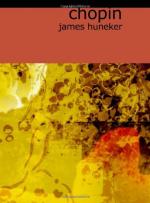Chopin must have broadened mentally as well as musically in this congenial, artistic environment. He went about, hobnobbed with princesses, and of the effect of this upon his compositions there can be no doubt. If he became more cosmopolitan he also became more artificial and for a time the salon with its perfumed, elegant atmosphere threatened to drug his talent into forgetfulness of loftier aims. Luckily the master-sculptor Life intervened and real troubles chiselled his character on tragic, broader and more passionate lines. He played frequently in public during 1832-1833 with Hiller, Liszt, Herz and Osborne, and much in private. There was some rivalry in this parterre of pianists. Liszt, Chopin and Hiller indulged in friendly contests and Chopin always came off winner when Polish music was essayed. He delighted in imitating his colleagues, Thalberg especially. Adolphe Brisson tells of a meeting of Sand, Chopin and Thalberg, where, as Mathias says, the lady “chattered like a magpie” and Thalberg, after being congratulated by Chopin on his magnificent virtuosity, reeled off polite phrases in return; doubtless he valued the Pole’s compliments for what they were worth. The moment his back was presented, Chopin at the keyboard was mocking him. It was then Chopin told Sand of his pupil, Georges Mathias, “c’est une bonne caboche.” Thalberg took his revenge whenever he could. After a concert by Chopin he astonished Hiller by shouting on the way home. In reply to questions he slily answered that he needed a forte as he had heard nothing but pianissimo the entire evening!
Chopin was never a hearty partisan of the Romantic movement. Its extravagance, misplaced enthusiasm, turbulence, attacks on church, state and tradition disturbed the finical Pole while noise, reclame and boisterousness chilled and repulsed him. He wished to be the Uhland of Poland, but he objected to smashing idols and refused to wade in gutters to reach his ideal. He was not a fighter, yet as one reviews the past half century it is his still small voice that has emerged from the din, the golden voice of a poet and not the roar of the artistic demagogues of his day. Liszt’s influence was stimulating, but what did not Chopin do for Liszt? Read Schumann. He managed in 1834 to go to Aix-la-Chapelle to attend the Lower Rhenish Music Festival. There he met Hiller and Mendelssohn at the painter Schadow’s and improvised marvellously, so Hiller writes. He visited Coblenz with Hiller before returning home.
Professor Niecks has a deep spring of personal humor which he taps at rare intervals. He remarks that “the coming to Paris and settlement there of his friend Matuszynski must have been very gratifying to Chopin, who felt so much the want of one with whom to sigh.” This slanting allusion is matched by his treatment of George Sand. After literally ratting her in a separate chapter, he winds up his work with the solemn assurance that he abstains “from




